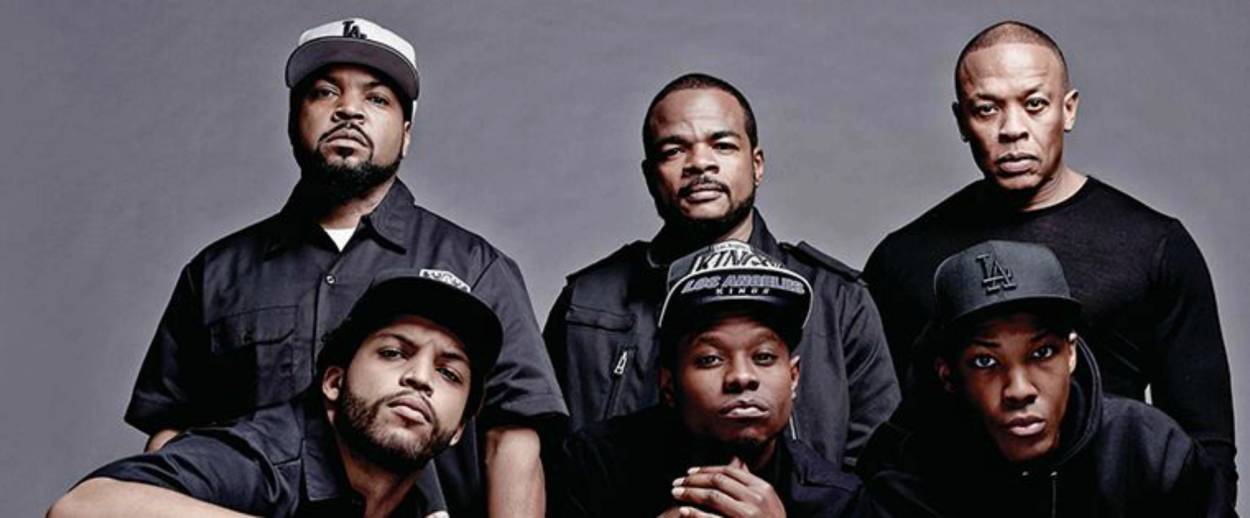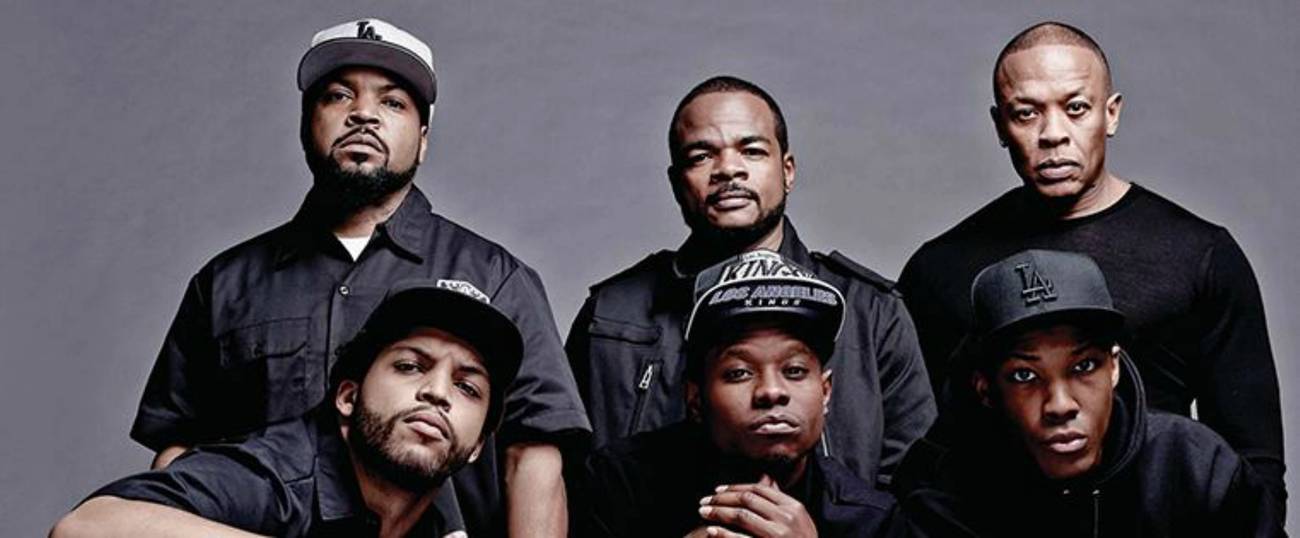The Story of N.W.A—and Their Jewish Manager—Hits the Big Screen
Straight Outta Compton tells the story of Jerry Heller who helped the gangsta rap collective achieve fame and fortune. But it came at a price.




A biopic of the pioneering rap group N.W.A opens in theaters across the country this weekend. Titled Straight Outta Compton, after the name of the group’s iconic 1988 album, the film portrays the life and rhymes of the hip-hop collective—members Arabian Prince, DJ Yella, Dr. Dre, Eazy-E, Ice Cube, and MC Ren—including the relationships between the members, their massive success, and the group’s ultimate disbanding. Jerry Heller is the Jewish music manager and mastermind behind the group that inspired a gangsta rap movement, and coined the phrase “Fuck Tha Police,” which became their anthem. Heller plays a central—but certainly not flattering—role in the N.W.A story. He propelled the group to fame and fortune, however he is also, in some circles, believed to have swindled money out of the group by taking advantage of their success. In an article published on Grantland this week, writer Amos Barshad writes the following about Heller’s portayral in the N.W.A movie:
For the first half of the movie, Paul Giamatti plays Heller as a pudgy ball of ambition and stubborn pride—a Borscht Belter with balls and a Fila jumpsuit. But by the end, he has met his inevitable fate: reduced to a whimpering louse, abandoned by our heroes and shamed for his sins.
Heller first got involved with the burgeoning California gangsta rap scene in 1987. Before this he had had moderate success as a road manager, arranging the transportation of rock ‘n’ roll stars to and from their concert venues. However, his career never quite took off—that is, not until he met Eric “Eazy-E” Wright when he was in his forties:
Heller was, at the time, sleeping on his parents’ couch and sniffing around for a hook back into the game. Wright was a local hotshot looking to get into that same game with his friends, Andre “Dr. Dre” Young and O’Shea “Ice Cube” Jackson, and their group, N----- With Attitude. And that’s when Heller’s life really began.
The article continues by describing events in Heller’s life, which sparked within him a realization that the angry, rebellious, “Fight the Power” voice of N.W.A had massive potential:
“I was older than them. I’d grown up during the Berkeley period, the Panthers and the Diggers. Immediately, I knew what it was.” He homes in on that first day at Macola (Records): “Right from that very first time I heard ‘Boyz-n-the Hood,’ I just knew that somehow I was in the right place at the right time.”
Heller became N.W.A’s manager, and the group subsequently enjoyed the success of six platinum records while becoming a cultural phenomenon. Out of all the members of N.W.A, Heller had a particularly close relationship with Eazy-E, who saw Heller as a father figure. However, it was the close nature of this relationship that eventually contributed to the souring of Heller’s relationship with N.W.A. Eazy-E and N.W.A began to suspect Heller of financial impropriety—taking percentages of the group’s earnings that weren’t rightfully he is. For the rappers, this was tantamount to betrayal. However, accounts of the N.W.A story differ and Heller insists he never took what he wasn’t owed.
“To this day, he denies any theft,” writes Barshad. “It’s simple, as he sees it.” Heller replied:
“Hey, man. If we were such bad guys, how come you never sued us?” (This, too, is echoed almost exactly in the movie.) He’ll go into the details, if you want: the business managers involved, the lawyers, the accountants. But the bottom line is this: He says he never took a dime that wasn’t his.
However, the situation worsened because the other members of N.W.A, aside from Eazy-E, saw Heller as dividing the group because of his favoritism towards Eazy. This feeling led to rapper Ice Cube to leave in 1989 and later produce a song called “No Vaseline” (1991) which described Heller as a Jew and a slave master, trying to “break up my crew.” This hit a raw nerve with Heller, writes Barshad:
“I think it’s one of the most vitriolic attacks on the Jewish people that I’ve ever seen,” Heller says. “And yeah, it hurt me. But I never believed that just because he wrote one of the most anti-Semitic songs of all time that he was anti-Semitic. It was just a way to sell records. Or maybe he did hate me. I don’t know. I could care less.”
The Grantland piece characterizes Heller as remaining steely and unapologetic when it comes to the likes of Ice Cube and Dr. Dre, but he softens up when it comes to speaking of Eazy-E, who died from AIDS-related causes in 1995.
While Straight Outta Compton tells the story of N.W.A predominantly from the perspective of Ice Cube, Heller says he’s not bothered by his negative portrayal, choosing instead to focus on the success he had with the group rather than the bad blood. For Heller’s version of the N.W.A story, he points to his ghost-written memoir, Ruthless, which he’s also trying to adapt into a movie.
And for those who still see him as evil, Heller explains, “I only say three words to them: ‘Read my book.’ When they do, that changes everything. I answer every single inquiry on Facebook. And everybody that writes to me, I send them a copy of the book. I buy 2,000 at a time and I send ’em all a copy, autographed. And every single word in there is the truth. Every. Single. Word.”
Jas Chana is a former intern at Tablet.